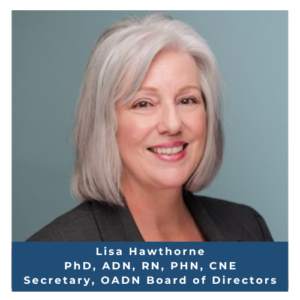A Commitment to Nursing Education Renewed

As my term of service with the Organization for Associate Degree Nursing (OADN) Board of Directors draws to a close, I reflect on the path ahead within OADN and across the broader landscape of nursing education and leadership. I remain profoundly grateful for the opportunities to collaborate with deans, directors, practicing nurses, researchers, and many other exceptional professionals through this remarkable organization. With the fall semester approaching, we are entering a season of new beginnings. We will see nursing education programs come alive with new nursing students, as well as new faculty.
Supporting and Recognizing Our Students
First-year nursing students arrive with a blend of excitement and uncertainty as they embark on the journey into the nursing profession. Now more than ever, we must provide support for success. Faculty and staff must be role models, demonstrating empathy and ensuring students feel valued and heard. Structured peer mentoring, student success initiatives, social support systems, and early exposure to professional nursing in practice areas are critical strategies for sustaining student engagement. For nursing students, professional identity in nursing is more than skill development. Students should be encouraged to join professional organizations, embrace nursing values, engage in scholarly reflection, and celebrate their personal and academic growth. As students meet the eligibility requirements, they should be encouraged to apply for induction into their Alpha Delta Nu Honor Society chapter, the only honor society for Associate Degree Nursing students.
New faculty bring nursing expertise, recent clinical experience, and a passion for teaching the next generation of nursing. However, while they are experts in their nursing specialties, many are novices in academic teaching. Support for new faculty should be intentional and sustained, as they may experience self-doubt. Leaders of programs should provide structured onboarding, mentorship with experienced educators, and professional development. Leaders should encourage faculty to lean into their new role as nurse educators and assist with building confidence and a sense of belonging.
New & Expanded Resources for Faculty
Furthermore, academic roles may include research, scholarship, and service expectations. The OADN Research Hub and the Teaching and Learning in Nursing journal, the official journal of OADN, can serve as scholarly sources to meet the expectations of new faculty. Simply, without educators, we do not have nurses!
As we begin this academic year, I want to remind our members that nursing is not just a discipline but a calling. For students and faculty, professional identity is a continuous process cultivated daily. It is co-created through consistent engagement, collaborative relationships, and shared values. New students and new faculty learn from each other. Let us all embrace this new journey together, as learners, educators, and nurses, grounded in the mission, vision, and work of OADN.
With gratitude and hope for the future,
Lisa Hawthorne
PhD, RN, PHN, CNE, FAADN
Secretary, OADN Board of Directors
